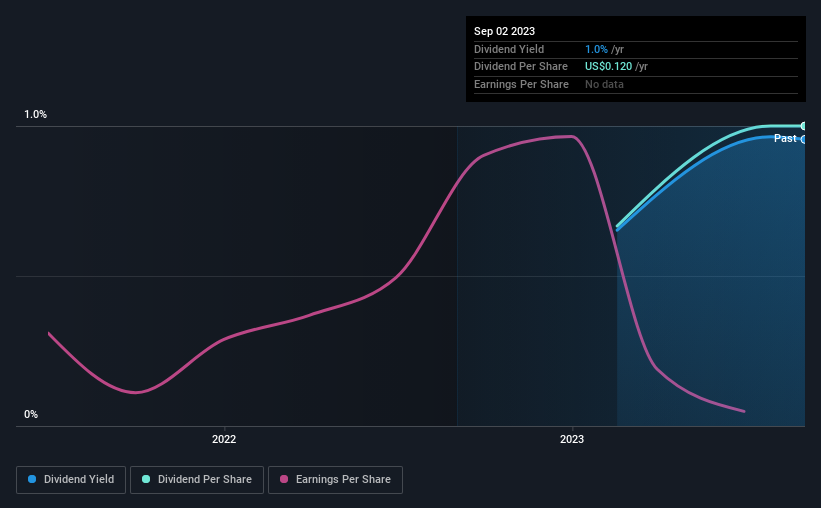Don't Buy Texas Community Bancshares, Inc. (NASDAQ:TCBS) For Its Next Dividend Without Doing These Checks
Readers hoping to buy Texas Community Bancshares, Inc. (NASDAQ:TCBS) for its dividend will need to make their move shortly, as the stock is about to trade ex-dividend. The ex-dividend date is one business day before the record date, which is the cut-off date for shareholders to be present on the company's books to be eligible for a dividend payment. It is important to be aware of the ex-dividend date because any trade on the stock needs to have been settled on or before the record date. Accordingly, Texas Community Bancshares investors that purchase the stock on or after the 7th of September will not receive the dividend, which will be paid on the 25th of September.
The upcoming dividend for Texas Community Bancshares will put a total of US$0.03 per share in shareholders' pockets. Dividends are a major contributor to investment returns for long term holders, but only if the dividend continues to be paid. So we need to check whether the dividend payments are covered, and if earnings are growing.
Check out our latest analysis for Texas Community Bancshares
Dividends are typically paid out of company income, so if a company pays out more than it earned, its dividend is usually at a higher risk of being cut. Texas Community Bancshares distributed an unsustainably high 170% of its profit as dividends to shareholders last year. Without extenuating circumstances, we'd consider the dividend at risk of a cut. Texas Community Bancshares paid a dividend despite reporting negative free cash flow last year. That's typically a bad combination and - if this were more than a one-off - not sustainable.
Generally, the higher a company's payout ratio, the more the dividend is at risk of being reduced.
Click here to see how much of its profit Texas Community Bancshares paid out over the last 12 months.
Have Earnings And Dividends Been Growing?
When earnings decline, dividend companies become much harder to analyse and own safely. Investors love dividends, so if earnings fall and the dividend is reduced, expect a stock to be sold off heavily at the same time. Texas Community Bancshares's earnings per share plummeted 90% over the past year,which is rarely good news for the dividend.
This is Texas Community Bancshares's first year of paying a dividend, which is exciting for shareholders - but it does mean there's no dividend history to examine.
The Bottom Line
Is Texas Community Bancshares an attractive dividend stock, or better left on the shelf? Earnings per share are in decline and Texas Community Bancshares is paying out what we feel is an uncomfortably high percentage of its profit as dividends. Generally we think dividend investors should avoid businesses in this situation, as high payout ratios and declining earnings can lead to the dividend being cut. Texas Community Bancshares doesn't appear to have a lot going for it, and we're not inclined to take a risk on owning it for the dividend.
With that being said, if you're still considering Texas Community Bancshares as an investment, you'll find it beneficial to know what risks this stock is facing. Every company has risks, and we've spotted 4 warning signs for Texas Community Bancshares (of which 1 is potentially serious!) you should know about.
If you're in the market for strong dividend payers, we recommend checking our selection of top dividend stocks.
Have feedback on this article? Concerned about the content? Get in touch with us directly. Alternatively, email editorial-team (at) simplywallst.com.
This article by Simply Wall St is general in nature. We provide commentary based on historical data and analyst forecasts only using an unbiased methodology and our articles are not intended to be financial advice. It does not constitute a recommendation to buy or sell any stock, and does not take account of your objectives, or your financial situation. We aim to bring you long-term focused analysis driven by fundamental data. Note that our analysis may not factor in the latest price-sensitive company announcements or qualitative material. Simply Wall St has no position in any stocks mentioned.

